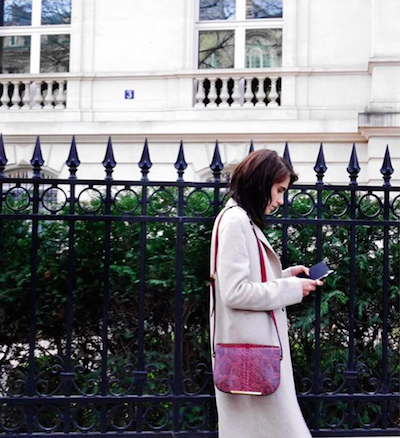Aside from having an engagement benefit for brands, influencer marketing could also lead to sales, according to new research.
Many luxury brands have adopted influencer marketing strategies, but it is not always easy to connect partnerships with personalities into conversions. A report from Olapic proves the commercial potential of these content collaborations, showing that 31 percent of consumers have bought a product or service because an influencer posted about it.
"Influencer content is significantly motivating purchases in the U.S. and in Europe, and authenticity and personalization are critical to their level of influence," said Pau Sabria, co-founder of Olapic, New York. "That is, influencer content is more resonant and powerful when influencers insert their own expertise, style and creativity.
"Olapic’s extensive work with brands, coupled with insights from this 'Psychology of Following' report, underscores the importance of working with influencers to help build brand equity, engagement and sales," he said.
"Influencers also have the ability to permeate the retail funnel and influence consumer purchasing habits...As consumers continue to place their trust in authentic and relevant influencers, luxury brands will need to tap into their reach to truly connect and engage with consumers in a deeper, more meaningful way."
Olapic’s “Psychology of Following,” conducted by CITE Research, polled 4,000 consumers who are active on social media between the ages of 16 and 61. The respondents came from the United States, United Kingdom, France and Germany.
Creating a following
Consumers have differing views on the definition of the term influencer. About half saw it as someone with at least 10,000 followers, with about four in 10 defining an influencer as someone employed by brands to help with promotion.
Only 21 percent linked influencers with being “famous.”
Influencer marketing is a tactic to reach the young, with the majority of those 45 and older stating they did not follow any influencers.

Younger consumers are the most apt to follow influencers. Image credit: Lancel
When asked to compare influencers’ feeds to those of non-influencers, consumers believe they have a predisposition to share more, have higher quality posts and publish more ads.
Consumers’ reasons for following a particular influencer vary depending on the topic the personality posts about.
In the beauty space, consumers value the aesthetic of the visuals published and information the most, while both fashion and lifestyle followers want to be inspired by influencers.
A third of consumers have a preference for content in the form of videos with sound, while a quarter prefer still images. However, still images have an audience with younger consumers, with 35 percent of those age 19 to 24 listing them as their favorite type of post.
With this focus on imagery, visual platforms were popular. Women are more apt to follow influencers on Instagram, while men prefer YouTube. Those 19 to 24 follow influencers on Instagram, while Facebook is the top platform for consumers 25 to 34.
Across the board, 43 consumers place the most importance on authenticity when deciding whether to trust an influencer. An influencer’s expertise is key for building trust for 39 percent, while 39 percent said they want to see products in use to believe an endorsement.
Men are more apt than women to desire expertise, with 41 percent calling that the most important aspect for establishing trust.
"When it comes to evaluating potential influencers for brands to work with, content is king," Mr. Sabria said. "Originality, authenticity and personalization all come into play, which means marketers have to give influencers a certain level of creative freedom. They can’t be too prescriptive, otherwise, they will end up hurting a product more than helping it.
"Keep in mind, influencers offer more objectivity than a latent piece of branded content," he said. "It’s a more balanced approach to endorsement than latent endorsement.
"That being said, luxury brands should also ensure the influencers they tap for content can serve as an extension of their brand voice. The influencers should be strongly aligned with their brand and understand what you’re the brand is trying to accomplish so that they can communicate that clearly to their following."
Influencer marketing for luxury brands is not always tied directly to a product itself. Particularly for products with high price tags, these influencers are tasked more with raising the brand profile than moving a specific SKU.
However, entry-level items have sometimes been pushed via this marketing method.
Beauty marketer Lancôme is on the hunt for a mysterious man in the French Riviera to promote a personified product line.
The brand invited a handful of influencers to the Côte d'Azur in search of Monsieur Big, sharing clues as to the character’s whereabouts and personality in a string of Instagram posts. The playful effort leaves the follower in suspense, encouraging repeat interactions with the brand's account (see story).
In good news for marketers using influencer marketing to drive conversions, 44 percent of consumers have thought about making a purchase following a personality’s post, and 31 percent have bought an item based on an endorsement. Additionally, 24 percent have recommended a product to someone else based on an influencer’s word.
Posts and purchases
Celebrity endorsements have been a longtime strategy for luxury marketers, but today’s increasingly interactive climate has shifted the manner in which these campaigns are created.
Social media has become a vital component of brand endorsements, with pressure put on celebrities to be more engaging. According to the “Age of Social Influence” report from Celebrity Intelligence and Fashion & Beauty Monitor, only 8 percent of brand survey takers claim to work with celebrity influencers who do not have a social media presence (see story).
One platform is working to connect influencer content and commerce.
Fashion ecommerce site Modalist has created a new tool designed to connect its shoppable platform with social media influencers.
The Modalist Social Runway will allow influencers on popular social media platforms such as Instagram to easily create shoppable sponsored content. With the increasing power that influencers hold in the fashion industry, this tool will allow brands to remove much of the friction between seeing an influencer post and purchasing the featured product (see story).
"Consumers today are always-on, always connected, splitting their time and attention between smartphones, smart TVs, smartwatches and the apps within," Mr. Sabria said. "With this explosion of devices, consumers are being bombarded with even more marketing messages than usual, and that marketing 'noise' gets even louder during the holiday season.
"Social influencers offer a way to help brands cut through the clutter to drive engagement and transactions."
{"ct":"UfEge3NUYXG51FrY1W1Y3GKWwChM9m6H\/ce0XTnLZve\/z69iar0U\/+V8+3b9rboG0jo\/9Fchmy2RyOP3XAShsGmDe8HiKIXe9yGFjCnB20A72d+RBrIT5SP\/O1jK74QwgR+XPuenwOASSJ7aKx0WIPRF8bLd9wGhOKhIDw8Mq\/uWaNF3SVvlL7PTJoQ7syTT5m\/KNXZf8DOKXBHLdbWhGm\/xsfwb\/biSYaozoq4TM2LX4+F1f3nXUylwTBIS+r+6DqIOxqxXhQDsaF1lTdaH0sB\/saOrVo9U56LzkHYvq1fOFBjFa2nPA3xjGUZicIxO824qvv95d0915gf6Kf+4ZUAlG6Aj1jfU5ns30HVw02m4zFaC6ghlsGmQOd7KdXWxdMj9nMN\/\/bwevFveS96h8UbVc2+uRoWJk0obpEseKCEHvTidT5RrOuIkUDk+ZRT21gG7vUXCk+MYpLeJO+C2pcWxdmCBGLqLbw8ytOoy8qRIc1LGchqptNNfkN1CU9ThsQ2C+RG4gTbQM7lVbg+Lqu9+KI+hPDuh9OAI19Q1UpiuIZMpdOSdOovWmpuM67NxN6cU\/wVQFf06dnMDaO\/fgB2J7w02rfvFHzB6ZONmnUP5o4GeU3Dg8oXgOxhIgrSkEKs+T979L1bM433nAq+bujah4J5Er8ynmMjKwWqNU7TWuaqdzc8IcadKOettUOUKGTi\/KP5KsQOBcofZ2hGA22+piu6GECAxIuP6GJpZIHCmf9rVmje0Qob4PYCsSG4sbi+YOckV8IpTpV+ULssdvWGhb\/R\/fhoNUYyijhvBu22AWl+WFNiOuzpMaCL4Z4W1ZpoS67HWGedyQMES+z8ABW0bLejtB3c80hv44QJvDtsBvdDQajX8b8pbiOJahYY5W0f0OQuOsBFjHG40mDRiZBelZt959+Sttka81a\/yyT3raXffMyf8jKYn1+LSQpVpvgVPyKVlCkWIoR4QO35lI2iw5QwOsHf9mMQOjanQBjnq0iB4Rzb5MdhATYD5ul\/Cf\/WdCSkmn1sdMTRUJW6dYQdELPxMvaD4XNBNBUaCbyylFTwF6pvh7Bq2H3aq4qWTLn8j17PRH6IKDAm2TQ3FgI4FsSPSqkZBQvKHJbNtUZQBcCvcfe12tcGVPb4PIgeuR9JqjBs3irRJeo+or0ENMEfEORsf640H+n+F18yn4urs8dZInkDC0y8cE3tIKnc\/kzeQ99bHUrkBHHCIIRdjaEzRw4PRKxY8GFyj7ddXayfZtYt1taz0uWyW5SfQqzsSv7U2qUN\/F7XoCDpvnG1+azImZwasYlGX5RHZVlnwKFElUmPqLIpauahY9aLFACk8GFHEzTkT4DgC4WgczzVR8wwPbHQeJQHhDw\/7hB7ZFOolQQvUTSVfcgVwS6AIvAHziaN0f\/g0mPESnfu4iwkNJB8oRH\/3qIH+bpNsFIkF\/Epm3RvqlFFuDJpqfmIqDaIMx2fpfnSzWnM4\/B7uuL14d\/oTLI5kN1CPCl\/2sEr9UaMlx9mugw1eMS\/31euVWw\/HcN6yKESxCQp9AQhwJ9NqcmDn6z7UPnWfpjgP5u7Lrt4he3+gZtRqbykCvZoIrPGhvOmlg290MS6rkstkUPKjMS4jS4Q784eGDGxCUfPXurakg4XGhe7pxAHyDI2xDtQ9zecAwdkp0jHwfcEt\/qHZM83KOoj5fq\/2icS\/Ma4bM7fV+8yaB7x7pgqsjvnhWauq7QsvPJh65UpIol3cmQPQRJUCOhmRRtBXrIXjhOBaNqDWTCRfy4uGvnRoZuEFbu\/M1XaD+G4WYOXAJy+qoY0I1jIbfXOIXJbE2Y67toW4J3og\/Ug\/vQ1EhKwlKGb4Lvhcz0TXBOjFJ9Jgt0iUk1NS+qHc5g1neG8aht9cBET4eT5bt6fLb27XqlUncragDngLF\/RcsC3Hu6gG2IvyGiuudp5h2r\/NheaCArntRbOoRpr3A42PcDhXnPj2vwgD6eezotURngvcuGVTUzWUsxStiTuDjcIVIMmE3MXCmlcTFfqz60bXCaMmiKHBqV5pRv3mFffMY4\/c3I9nFEjKIMat7FaOCvVa953376\/P1vKgnnErl5HM30r7WZ2ymGzFCtUP8whMj96MljzkWwqfR1vdmDIkvbNdUU2GoG2qyRjOBxzSg4J3j7c9MMvxs\/bQNqy2\/cy9HklKaL0G2Zac45v9XFEmCcbqB8vl5ht\/TWjTbqTvp0\/2IB4evDm\/oSZHubB4SJxQePVlH5UqRsBUf2SSyjCnXjQUVLkiwYDxF+lImcBAoibyOhDnz2T\/NNWF11tU76PLAGXse0v6ta\/qtWKp3n1AckAVdxBBNE2nUoBGqPtMI8JD3IzqFaylqIy3D7Hf8WBhvOo33qMGuDlGo0sArY6uQISNGA5XHd95roglPoqhWxEmhctcClOYWIiS7u2KE9WAb8O\/zCWC\/Wn75hbMYMpX6OoWE0cVV9OfAo3AYyMcH7o0\/Bp1WfY7rD++7Uu9v+saPAWJ8ix0DG4fX\/cnU3wJMaJ9CkBpeX857oAfqJ9dCJKGnxT7TH627zLXzymFQF8mit8DZTfEapdqjA0EJ2DaLH3unptH6Dn+2UArffJBynRxt0pkCXlmbHbIdklv+ySy5ttgBDpbxrY1nsYYUI7RNYOX8ibpvxnm3R7Uz\/A5cZ39C65QypygcwShhqhQm4g8pS6yO0n47ctZQ3e6OV\/iAzXjQV7bh70p+EnIfBZTWV9THZg9M4Um3jH4SrnY4TMbC1Uu8X7ivUyIRaCQnjZiseBi8DTGyAQom+fc06lRJ+o4uC8J0PhaTVnckM9SubvB5l8FuDARQ3iFmjrEaDDN3FG47beZAED2+PTyKv9q902B+b1DxzLTP\/Lz+PgSt0u1E9MhMSnUWj5y6V1zOMtumF5jc7DieZF8EXRASyI8o8gWiNngCrzxha49Rd4C5IQdlj\/h3AjczlE9h9OXTYHNNOtmlJBmUIsV7\/TEMhg0gl619Bw0deHynl6HyzS6BbkSViAtaUxf7yFLJW\/B\/NUy6EQx9Pt3gmUdlqkFxAvLwHKt33Ec1UfpAjE4pj2UiJPUY0dJ57fsT2lJvOyMv7KSewAbpaaEWPoVbkihJOWJzi\/Sl\/Y8k61NSulAw7w\/1LwRv3QkWUlKj5Lx1YU4cqTYl4SHjuxM+ZXL7x9vUuoZuRmx5bmhrrvNerQIHtIyPAsm2UZguIrzAdP+N5YkVdsV267vRouIYRaGubaDZajpVbW85YKS0ieIMZ4sk1FQcpkmHtEcoRyCaIb3AUDnFoq4UEjfb\/2l1aO651Ft8XLRoGYk6InPAOQpq\/GVn7GB3s0Ji7CksOTfBhuGF0QO72AgM9EsZc7IVJZ4gQxlWg+BloK2LWm3KFdJMx+JaqEEEoStMChYbPzQoS+w9O+AXL0kdwTENQChF4mxumbO4FZnMEFH7VXf3yq+1oSPa63HUuCXipTMB+4Yy0mCuEbeizbyp47a4iRR\/fcuOniD7oXK7hObQcEQFllrS7kX+6cBdBgrd0KGaWLwD7fWapYqsoVmrkhOKUd75aUB3BhYOreBXd5suVB+m8vDpq7nnJqrci4QU3XyruJlxA07jVdlT2UJq7Q59523ZMy1P9NoiHHBwGuv7UvkrFeKR9+lHbVsHjaknim\/IcW4mffFsAsWGgX0VxQYFAzfNP4Ts7MMWT9\/23W+fAOIwze6siEZs\/spi+h+gcOv\/aD5Sxt\/NF9PfI6Nt9SU4EmOq5RCyJOkxVd7Fx4vnBeYGyCk0+jC75Ds999skiS0Ah+yJNfeOq5E45JbfOU7zg7l47rj\/7yNNDRUvNrBSng4E5c4JQ1RphjMTPUFSA9yavo3OblRxH002mJCTD7smqQQo9dKwe0Ml8pqDGtzE5WZtwedBd3XgyGAIu7cDNthyEbnWR4ta9IRUXMz1xWwp6PusE9l+sMtnDzzAVlyKpNPr16KTheVwK32HGTTJEXmIjufFHd+iqyC26yPenI47FKQUelIi9RfeCcl73lQrqwWu7VBBKboaQWgFiOODgQcoUKQGqaX64vz9KSxVKlSXGF\/0wfh\/SNSVMvyUTu7l07akH+LQ3jqI+w+sd0nnWi\/DwTm1rL8YeIZmQyqjJtNUddFWLkYLSQij5Ef340PZhq9JSs4mvAVgcy03UHZEKYkyYB25MovcN6Q7n5\/M5WG5WOHdIivnTownUoEDBhLSmfvjzTaor2T8ViyxhCC4tTYXPmSVyL8nuunvoIfxAEh2oTzSTWlHeRz3cwsYV66JE+Pun5YBHibPPrXp1l186IN31WP2vh97zWFANSTnd6NG+PYJ6oihwmWsDWm2YYVqBPTcOVObhULqU48U5YzZH\/H8jDLjV7sjQvMxMgj7EXw6RjNMYh1c3CifWD\/4r\/KaHdJMcHR6n\/BvglhyV7s1tKkO8agKxGYmSWTQ7fBJ5KDYfGmYYZKD5gdoXVUNaVn7cEWUDhX57bHeCcgfw1XpkLZuk39Cnu9CmCbgTg3zLAvr2lx6f1aOa4a0cfNzvOwUA1yJ5hOHF\/iucUaYIF2p1j+DcysnCZfb54vBMsEWllAsKtPcjeMWe2g3jL6ShgLFl24xa4d5xgLZrvXBqKeXLctCCG7P2H\/l1O1Mfsuw+K+tKJurKvK+BiD0VZlmQAJU9xib6o2u+smqXp89XisHb0w\/EyufyAVffE\/Rtm2mu+f+VVfn7FYbMYV0sFzMOL0XLjnBvmElEvp8gp5\/Lv9pnuZb0\/f2mIiVf9QMcoK4OSrl\/r35+Uo6QC9x\/MEhFXjTJVTHyGlalWLvV1jnrfajLnfd5aqoatMHnR4mqLEn2Uw5djBRF\/\/E9mKod+1PCuQwdmWeOd4WAQQjqs\/V8T7YEfKntD\/xufVA0WGzmwbWIe5+aF3Y5yWoTN6ItDdD3GB7Y+jGxIOUZ9V17dZHuWss7urgKCUvPS+9+bMfPDUXeRYtl5AZX9lYDTJuA31CEN7tAW2i6y+0lmyZQKJ8e9icqNXXIZNMp7NjQnWli4lNQ7Mk0e8QVuiY31vafJ56PQe9ne0hIXQal0bqoRAsukarUzs4jkHSF1BR5hvIFFwm5u7ESBGTYPPWEc6whDegWRKZYUuagVc5YOiKfflesMM+jLyS4j6ndJmhq01i155pjcyaQCh9aGQQ0PiW0UgETbaLk73mZZv3RGVGuK3nFYQ5iof3Z9NWmPeTiudnYaq2Z+IZTBwbJWRQzyK5w2t47tmLIMAbQN7eZAbkEJ+YgAfQGOMVcyzlQMj+c0X0tj27vnx\/KCd3s53ypCov8QuyUtfKAmPIs8ppxgICfudvjs5LRNB7MJKp6DI8CA7IkmJWxpvTzHAh+YqL26c5lc0pkvJB+1kU\/VjACW6F6paBcW41OKhzvC3nxh\/GhPJTES5bqk1yye+FypD69LrvIsV6JHRxmMK\/qpc5YRRKyfYPoga6fP\/SF6z3sd2Cxy5QXmFodQ2ax0WCMlea2wva\/eB3157+BRmEZ7Bej79VXqh10G4d9bL249of93qvtDB0gTO02ZcfFQNUIuWhY+fcve5jAP\/i8sB1wlwcKyAncs4iYgDX2MjzHAvjQO9D+cUlyqjsQWje+aocqHElL687py9UAkTKEA3EgaGejjhosmXCbi5O5d7kUoGme\/DXQRYHGHKURTncQ9Te0ENhVAIqBtrBR\/B819SlYW0YFddbR5WB1VttQ2RXpUqD5zSHBBVKKPmUyiRicUVzAn0hTkbEvP5QEGc59PZ1M0cXpX6mStNLH+R0wiuTE+f59Cyq0wJhSkqFag8ih27eNVF\/OUJLRM5aeB8API2ElPeIOcDCxq4Pl6bsOwooGpkrC9c\/wFxBs42LgNh1Zoi6sVK9DEgDDA0VD6vCSTGg3LHnc9sY+eS\/zTHYQmscL57trw\/Ib4nEO2p23vfR9ndmpweX7fT6qKo\/yJ7CIJRLxW+xfQRReFQKPwgCUjGvAWPL9fInaVD1W7JNgyJ5uaY11ATrIzvUGFr77f8S\/0Yd8iZYVQVqsV4sqQBtKoAeCvtxKC+o9RArqgInj6ZekWiQIlU8F2aRTxkNmAldSci+jfcoic4cn9SQgg11McyhkC5aW8Xm4DeCOD3ef4ZGz3DiINfTjlMOYi9UJfb658NKsJD4XDpW+f+LWyDXTlDZD62eBbzo3FUzSfDGjD7B0vUz21F3rdXFsmERdzdNCF6zZuum40MHB3+kxMyve9H10S50SoYix8NhZRVGUE5exsJT\/olxofbWaOTUEdoizjg0EQ\/mjYJOG7yz897n1opOQ81rQ5EffM6Nq6yTAyEaTsyfMiq\/gBKkzdBfTnSK2zAdKpsbPfdxo3riytaGw6rS0qXEwcu3kSQNWyYspYndB7ZjRD2ZXaOUdNYzoPDhdwSAKXPFgoifT20GZ76PBm11AOKxDoirSwZnCeWJ3RdqKze1BFUYBkHMHx+95tUF7G6\/f9cvjtwp6Xiz\/VORuiFPUhLjj+T89RIlc1NmV3Nbpf43BZKACxScEqunGTC7tMCa44gC\/tTXLL6HrcO+2WBGmVryWhSRRbtK8frxAi4K3NN5Q5qVqDH82QJaLbP6mLseQFy8Nfb5XyxPXUeXxe8YG4dcjFSqG1w7AayXArd8NKXxPSjoNYj1vtNMI8ceh9W7hY2nRo+77saqZ0bu85Ao93eluT0CGgAysmjPYnuU59aHthYbi7J4PC\/UPsO33wvd6pCNNzVeo0DpoWjGwLgzKQxKx95eF2TdeyaCdd1WGVBM\/TADuyBiV6IrHrEe5qNIuCcAaUJ09s0RU3rxB+x9HZ0GxalCIbD4vbmQ0\/1XifXKVX\/tL4e\/B5AKYeJUpkG18Tr4R0kE54YX3QQpEsfq7ihr5OOSCV2eA2Y3Y\/YQAX63\/qxiUM8hfgsbwTRzu7OpSdfD5IV+mJPuTFEZw9YizWeEzJ7m33jSwqn9JfLrl5dhOpAlx3Vb5JeI0938AYxjG04zrUoUo65Ir9ut2yD523ZK22uKxaSt6BkKDWLojfbHztXdUkX3fSBxKUI9WAtR3O9taBQpU70f89gfouKQqVEhqW7dzrKhLni3wfWZUZLBOaaoPdrSQVJ2NSDQ4Ncd4dmqvyrCSa5BBGIbpgsH+44zuzuGnyo6rjnGQ9vd2QeSTtJafBlK2aLTKejmFpfUtrr6vy6s1pR+gLvWlB5k8Vclni\/Q9QJ\/mprWmIk8+Oiemg5v7q2nKf\/cih378HlFXYQDDpmad78aWx+EfYR+wWY2Rd36WMZ5LZCoYnDwexeT+QGopKnTIxzk7KNBC69c6HN9+PFSyuS\/x0cPmLeTqNrRunkpG3i4NyC6BpEOF+CJ6\/GW06d63GBa8i7lL40PEMkI7P8gVu\/HBYPw9ykA+m+rbxQ2AXcdXdWalDEeH7AkCS4ohPFCSRUyaGYSpJcnjkdu1Nu9tPF8B\/F\/CSO\/ao+ewOnXNkR25XOYwaZeNfIpu3lxAyI+5dEwKCi2il1gxJxFaMkG6wGjzlyB83KzVpY+UuO29kSk10RP2AGWeyEXtImCdO6\/9\/pvr3pHKfEWg3xJFecf5wfx2t1he\/FFT22yNJfz+VibP1Ugkmx1ILwlY6UEMzey\/MkzuTns6fXHiC7C0kGN23AIFTGh7iPoziscTCRbVDqVQeU7ngnsgo+K2B4marKOWmlAydbqVxSkD9vjwPA+IiLINnSqEJc9AlDbKnfW+rFzZdIyWk41cfSjL3ucPiykfUma8r1wQTLzIyEZm6z07j9a\/s8nHZ+LCuwjPDbaDEFv4kNSy3GmTvDJm5\/BEPRaXTPd9rZa+ZDlyN+\/REOK457Pp66YJor8zkkRd5rt0snVJfRuZmMPgii8ZYBWH+9gks\/FaP6JxC9ISZ2odxcmzNfZiaALSn\/XUKTWs6hikquHL7tCoIt37ntb+OC4W0uSHMws+4WDv07GzLVonNB9JTJB1o5eZFEa55eBYHiZ7ILnvi7qlIYLqqiewl2z9HjImDxm2qD9yF29A2Y5DbVUCX2Yg9RS6GbJxk4u0Fu7aIo7mFcSqD\/tfoTNf\/\/Nh5XhjEFcyulbGSD9SorRc8g7H670hUdZ6miUI91L8v+R1x+v14isCO7lkxwiyz96ciNOfLUwfioJgMDqp3iCRQaw+vhKfM+9NYo0Oh2od+0ckUxJdjXeBemIL6Vh\/lbBQUG03COkJB6MZ6c5nd\/AH670VkaMUcjRXtTLdOzqdWkeJOESTTTg5lDRJwseTA4ZwZwavc0TJCjtyllhCv2M09nwNvWLerAMhSGG2LVTd37Q7+zylOn34uGrviFTc3T9RFNNzM8CSw0QMlKGZ2\/1dWJwSxLV\/RMvCJ9k+hmqAwlWUB2T6+6\/7BXk5LpYh9ipnrKI1PYZlize8V37rxvIDcN23uPgpoKhW3MemF+pi+2CN91bedrbn\/lNgXYsZ8Yw4slYA97Bj\/CriFhe25TYTM5GeWubJUWbkOjASOoNRaU9bOrKXF8+Jwm4VVzmZq6b5\/R0w5LYis\/HNu2MbjZ7s9XCo8T+BPgUgPHaU\/sHbjndA6RJf+BAS\/d7CNHa23O3Qndwu1g87LnmYq+3vq+dBq+ZiagtH3Xro\/Pp1rAPZR28So\/3r6VDNMLecoa2n+fnLvbUFBx3yNa46ALDEAjFc+SnZotcsbBLs+OGSzs\/O90bdDAoTF5E4sG6Nv4NEsLZEuXd9WCEP5UG5jzQy+1yOJdIvzccQyBofM815MCv3tsIGcB0c+Td9ZnhLFz5TSNsZ6e5x9DjhyvZ9LonlrHf14of30eZ+Isi2YDboxxhOgeXKs9iS9najZHQhJtd+VDcGhCpB5O8vrtijvcmvd9MCNm0OAbTiSF7Mb+5AMXPxLyGlNMMoPNwgE+hlYp+OrL6\/EzoXQAVYih7mB884qCMjBLSGLFZ8AkpxFhJEG9i4wyqYU\/62XyKNRh+\/zOfocMMDLL5VAl5dlrk64KI4E9SfqhKbkOOsJyRLjiZ6LxnUHSYoWuV6k5GV6Y9ZyQf5K7A2CJFsms2d7WauQ4VW7vJGHAJi24VJpH\/1nVphYmdhDqHB3oPXkWCEn16uu6Sa4GI2T7JN84uqRTUQ7KlmKFWI7wB2klf9y6\/B0hnUkt9K2FK3ox1\/kqYkIPjzrykrCk8kwzXBvAhJcuzJO31mwPmv4r0DAHgPK3cn2EAAo6XuwnBNZuZWcPdbQ+Uovh8IAKDgUfgQVccc2e141Q9fy89a\/LTdEKLMnyCjtwXSMkoQCl9UomkaV\/U3CNP6dx0acauqZajvbK4GwqAAlxWh24vWZofGpkb\/TMHNOkA39vPRuc6y60oXZgWnteUj23f5pCYclNkyAn7lNPMSxkfkXwJeRoJ7vPSxboKFvIXjik1NL5zLny8GmLeZJXQKyH49\/eU6dslXqYz08QcrShCVxe6dXg76EQcQ7VMx608jHYmkjJJ3RNwppPGJHSW8Wwn\/98xfVY1WR65o4PmgBlvccnyqhj\/+vhGdTWTIMllu6VDgxrV1C4zhnTJQisABWqFWLqEtQYw\/ML9ITQLOAcFvvv6286Zx5nIQBe0OodY4icy2AoX+eDrMVeXYE2znUpzuFmVy9yJt1uXtI9cJqKfnEgFIczdgRl9jQ\/\/xu7aZ+eCZM4NGZ9SZK9D9wCIKB0nrGK\/YxbnMAzJ8l7YQDEm1Q\/bgJcEFazWPftBJsgVNJwzS3h0qTaZiqMci\/iGPxThtRGj\/rePG5RSNtaFFy47t5tygXAxrm15cK6J6lgcR7Ix3l24ax6xXXp0PEGNTrZp7vp5OPpF841f7Nbwv6bzs3iVqp6P3UNgvNSlcJajedO82tUIrLZTz6U\/fo67Dpx6qxqshv4JvwV\/1HZUG0fUPaoGU1OmYLeJJ8MvTKOWEczAmFOSCyMHx6jooGJzhnAW8ajBjD7I+DQVbq7f8RPzIfb30uQbOFZPxpNcby3PNrxOpzOnAmaZV6Y8+aj9Cr\/cMnJmb2bQ3hZ3yEIA0j1w3eMbriECz\/IHfNj5EKxgSbBFg0RZubn+KLQsIkzZ7R5X8i5tZHEXEnO5YhJmvoRJyTnRsJI77edCnUKJg0n3pEJW+L7dzULAxFBmQUuR0jObsNhMhp9erxRkgUpapbbW7mcYL14q7wVjPWz9J0JydQa0xXdIHBpUe95Hbkad3dmo7Y3alB8DgNnKlb\/S+q\/1hL8epRxoBzjdbPfuJrle8vZVzR2UXzJuGyqDCeDCcwxXAtJZo\/8fFkAf+pzcI31rhrHfynb\/HF3D4TstSZDIOWOfnikiDQubgDOInQ13tLQOSOOYbSbRoDa3P4SFn28s3oTbpUVK\/B7LX7AzB6p1uQUoL5Bx9GS0ixtQiONzQu\/dCLCiiPxyWpO8xbD8xGEvl\/jjbom5\/7J\/D3DtWkBbRKv5m9kOCdozYFl+3Fe6a+bysO5TYHq\/9qAv+Cqg+K5jm1fL2kwYgnW1Dj5DJ1EiQWgeNw4Eeu6I6B3R5xAd2Hd7jymG9WY+gbhv4cSAMSZGR0gjHUfwCySGAe\/0UDs5aK360W4MTVXDTVfUUNgIw07Xmgqu3ba206MWcCf\/bS9lwfmzjo\/SAntXPG3W5+xNxRSGUnPtPaVPdr7sLFR3t8AE4On2pcBImEtz+cSsaeUWRZkNdZl5xiS8X9qYLqASdIcJZGmPmotf1EJ6ws3FPPUYmXEvSPOnbEFLIRpYj9QpDT7tf9jWz\/PUbMksXcjxqwRpj3hK5mTOE\/FZUGeIfY004QYFnenop9RyHp7oBZh+v20MwyxW+PoSLXKWd7BMFxV2Z0KSQp4KtAQd05+e8p5pPL\/ayqwOenA9PE9gJBY5kY2mB6xSWVU9AQFTM+ErIF8M+pGbeg1rGhDg5kXyA3U6DNI1r4eo9Gv+8Yf9uSWBHNYgVRnCcVFXQmyO+mZyUH+9Yc31MyAgSmy91Ln5m+V6Xs3Tq3CBzhAt17NEFUrevj5eVwhpxwwsnvYuvhhMNOTqCUIrLQ559Pq56kGS435VdAz+\/3ACA2Zm1PgMGz2wq\/+7PrVmk+SOSqGQipHtaPt1KsIipCxOAfRxc0kIcx6emf99Ct5jWRgeExPFoayfBuerg3RhMJOpyxOtvpjtKORnQY3a+98XCQSfrF+LBWhF3Fp+Hs8KJldiaHcQmccC0zIXQ\/u0+PlKKQc6TXyhr7HXC\/NNVLTYqqeKtXl5mQAoctt50pmrjaF0AHYSTtH2+FSpnBobZJo7qQRbVrtJ8Rcb+DTwzrrvGWcfHClWiUdyoRpPflRwrt7RMwrFkbScSwL3GyeomphVehXQhnj56kBwwPEyDgRTHLkJUSxE8tqLbf9et\/BXQap8CNR6t91eVbBl3W9QRMJyu6XnFtcOyIlO\/Dcc4G8yOrRWa6HqcuQtWroJCbqX4TtU2soObX68x25nBwhYqkZ6zZ0Fnu\/qkHzk2mg4C671O+M5FLiL4IHXUOgBxC09YO7+UBhRHD7UVPfd0Uoj1GEZnHa0FpNxJkv1WAVHYQupc1ZTogBIjCGD2wy8jv2qJArQwfFexksl2oJKhpQM8xP2+6+dPoPG7ArjjUnCsbrdxy54C1sCAJ6tFFpVvxYzcq31mRxM5NfIVSOAg\/Pn3LB4C\/HfjmlO4BAOQagMOdn3SV9rZHNyrpjdEsm9TG19ZeEVgZRltA071IqPIcm7TAd0oZ+UxPn3mpgYvSKHd\/hfZoREfHjo1+D2K9prqONQl\/zoOpGqFplJwMQ7XzHHAb385q+3fh9g1LUsZ0k4FIERn5eFqboQVfFkHkAaI30dHN4ga7+8Sfu9OU7G6yGOHfUCr1nTBVnMO1nn1ptU\/DBGo+vHYfMaLZW\/HYHW\/ChUXJCpuzfllcOSwF2BIKxUEy0rHgK8IVjURRWJ291\/3C2gTULKQVmi+9mZVf3VTXkC+DSEby\/rIaFqb2UjTa8Kg95GMIq8n0Bgg4E1y0wnwnGPJTschSs+3oPuMNNt\/5dMY0omDAroPBLR05+JvXC6oe7R75sXSWL5mU7lyCNl1AUw2rrJSB4pxXlVf3I5OMwqgjqDpX4Y1guaR5oMGhT\/pOQf6eGy\/TEbVKqDWkgOWYhFNjcBIAZxKmcP1GS8\/9ofVK3XeAQoACPCUb9b8AUygJhpRicXEqGPgibNvuEy1s9VSo4YTLqMBhvknmv51ah6z7fFUPmpagXV4n4\/W8CT8Qd7Cw5zNfROHACfdAKGvZBbvX+\/8FanxdUKtS\/FHMJXTesOLK6YZEJzLDnFdI2+7F344J6eVMIMKA+mb\/fmhMumxGORKelMkdXn7c1M3bf6l38g9xA7Fbwss2YVr22x6nQYDt7D4hYTmt\/t\/OQX1+Z0gJc5wodFJntAhoBnN3Hzj7dc3T5AljWgylurbaW1OF7J4XD7w\/oFA2AfTzeJMNos5VNkyP460dMrbpyHuE7n1TD4L2DqO7sxhm11s1nnN91P7ufI0tXO2uisV\/HDbnADJnAKZnCXHuNYaDRy+GqdU8XdqoIrGr553TcGD5W+fjk2509aeZ8B+zBlzCrEf8z24B6tjq\/rkTaFSaBwPPsLb8rq6OKH1aIrA6Shfx6S9pxEB5HrYKkCYWbA7vRR3LJFSrikyc9pgCGnxC32c6Ip8KmRt8h+XhviF6PR7Kt6wyISB5lDs9SZSPYtjd\/L+MxTq2m6BGOXsT7ZuefvF1v+D694UfUhGCKV\/SwlPXje6sjxTRscCZTguEEdTLVemfaBKi0DWB\/eVnJXxMZ7IOTnY06qqyPSgmgP3z\/XkHWfyfivpjB8up0kHblEieifGy3tUCEQwcIgZNR1iGtFRRWoukQiUrYB8cSnlzfqB2SA+nt45VbavzjzQBIN0QD5uAEbLXEBVBT7ZemeWrN\/CWLuDoK0sPR9hZL1uaRL2drWRQiFi81EEBCevygi\/Xb3Gmu95+Wjep4VjRCKqGJQcLAN\/PckZkg6kx3XukxWz\/+1pt220LrK9yyjU8GgIqk2yipjjq2YTzV3AfF257OBsaUkCFE3JiaAYupoBnYtrLy5xAUDoRTb34t6FBkq9S5Ac7tR1am0jHgOOuXjruLxAdm2IcmlIeoSnDSrpNQWtFitQ8Nwp6+XJWNwVV403Uw1gI146JFkrARwDp5MaTEjDm9vfM5vXFKAUmL93qCM5EsNSypW79rnFkW4ymNeIWsvMHXpmZY5bifldGW8Fvo3GgeCaDwce+RoaOlPAF26YPpN2TRfY+\/ia6srjUh0BYwqx3MqwtkUcI3CUkGIKnpwaBbFbcbzDeYhXGCB1jAT\/YwUqkEnvkwD8ioXOy1YwdueqIw71Ux\/vbNiJDBjWeV4AB4aepcaxWQawzI+SikF5er3D79dlujCbyhsxwjh3wHy04EJ+s5SDu1yuPxLA\/gicw3KMM=","iv":"28777d36139e879f26f4f131def12abb","s":"73f38b50860bf8b7"}

 The Blonde Salad's Chiara Ferragni worked with Tod's on a capsule. Image credit: Tod's
The Blonde Salad's Chiara Ferragni worked with Tod's on a capsule. Image credit: Tod's